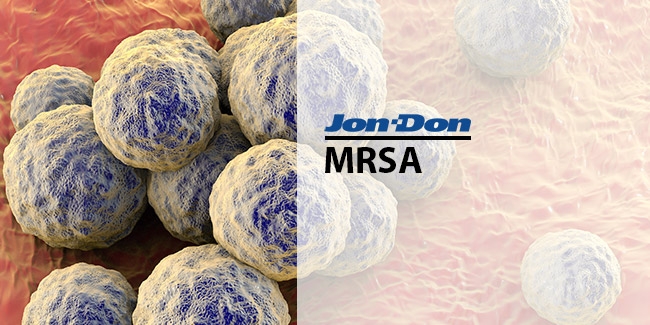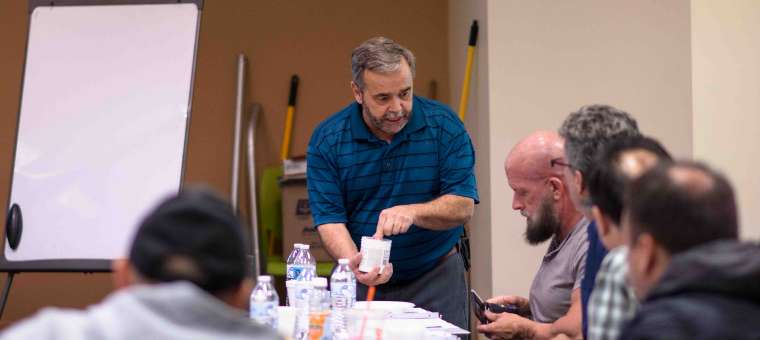
MRSA
MRSA, also known as “The Super Bug,” is a form of staph infection that is resistant common antibiotics, making it exceptionally difficult to treat. Staph infections, including MRSA, used to be almost exclusively hospital-borne infections. But in the 1990s, however, a type of MRSA began showing up in the wider community known as Community-Associated MRSA (CA-MRSA).
Both MRSA and CA-MRSA cause skin and soft tissue infections and can lead to pneumonia or even death. The virus can progress substantially in as little as 24-48 hours after initial topical symptoms are detected. After just 72 hours, MRSA can take significant hold in human tissues and resist treatment.
Like other staph infections, MRSA is passed from person to person through direct contact with skin or through contact with contaminated items. The bacteria may live in people’s noses and on their skin, and usually don’t cause any problems. However, young children, the elderly, and individuals with immune deficiencies are at particular risk.
Building service contractors and janitorial crews should use a high-quality, EPA-registered disinfectant/cleaner/sanitizer to clean any surfaces that may potentially be contaminated with MRSA. Areas of the facility where people share close quarters (such as locker rooms, athletic areas, or community showers) or areas that people touch frequently (such as handrails, light switches, drinking fountains, tables, and desks) should be thoroughly disinfected on a daily basis.
Jon-Don carries a full selection of hospital-grade disinfectants specifically rated to kill MRSA and other highly contagious pathogens. In addition, we supply the personal protective equipment you need to protect your health on the job.
Preventing MRSA Infections
Using commonsense personal hygiene practices and limiting contact with other persons, you can help prevent the spread of MRSA. The following are suggestions from the Centers for Disease Control and Prevention:
Personal Hygiene Tips
- Wash hands using liquid soap and water frequently, especially after using the toilet and after any hands-on contact with other persons. Alternatively, an alcohol-based hand rub can be used according to label instructions. Visibly soiled hands should be washed with soap and water rather than an alcohol-based hand rub.
- Dry hands with disposable paper towels or air blowers. Avoid sharing towels.
- Limit sharing of personal items (e.g., towels clothing and soap).
- Keep skin lesions (e.g., boils, insect bites, open sores or cuts) covered with a clean, dry dressing.
- Use a barrier (e.g., a towel or a layer of clothing) between the skin and shared equipment
- Shower if there has been substantial skin-on-skin contact with another person.
- Athletes with active skin and soft tissue infections should not participate in wrestling until wounds are completely healed. Consider using this rule for all contact sports.
Disinfecting Athletic Areas from MRSA
In an athletic facility, special care must be taken to prevent the spread of MRSA. Because people tend to touch multiple surfaces (such as sharing gym equipment, sitting on locker room benches, using wrestling mats, etc) these environments are at particular risk for spreading the disease.
Here are some specific recommendations for cleaning your facility:
- All hard surfaces that may come in contact with body fluids should be cleaned and disinfected daily with a Microban QGC diluted at 2 oz per gallon. These surfaces include benches, weights, workout machines, etc.
- All floors/wall padding in athletic settings should be washed daily (if room is used).
- Locker rooms, including any shower areas, should be cleaned daily, if used.
- If soap is furnished, it should be accessible from a wall dispenser.
- Ensure that athletic areas, locker rooms, and restrooms all have separate cleaning mops and buckets. Ensure that all mops (washable microfiber heads or disposable mop cloths) and buckets are cleaned regularly.
- Consider making spray bottles of disinfectant available for patrons and staff to clean frequently touched surfaces of shared equipment between uses and provide instruction (e.g., new user orientation or posters) for the safe use of the disinfectant.
- Note: There is no evidence that spraying or fogging rooms or surfaces with disinfectants will prevent MRSA infections more effectively than frequent spray-and-wipe cleaning methods.



